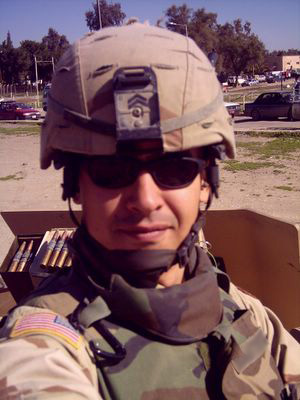The Straight Word...Straight From an Iraqi Citizen...PART 3 (Finale)
Here is the final installment on the interview of "Steve" and "Jim," interpreters for my platoon.
The last question I asked the terps was this: "What is the most important thing you would like to say about our liberation of Iraq?"
Jim answered, "Democracy is great. We are so glad that you have given us our freedom. The main thing now is that the people need to learn the true meaning of democracy. When the people understand what democracy truly entails, how to use their newfound freedom, things will be good. Overall, things are very good now that Saddam is gone. We hope that when the Americans do finally leave, we will be able to keep our country on the right track."
Steve echoed his sentiments: "I believe that Iraq will soon be the model of democracy in the Mid-East. Just like Poland, who showed the Eastern Bloc that democracy can flourish, even in a region that has been ruled so horribly, like the way that we were in the past. Freedom should do well here. The people need to learn how to manage their newfound freedom. When they learn that, Iraq will do great things."
From all I have seen, I think that Iraq will do well in the future. As with growing nations, there will be bumps; there will be roadblocks that stop progress for a while; there will be some wrong turns; but eventually, the country will arrive at the destination of functional democracy. They will succeed.
I hope to continue with interviews or questions for the interpreters. If any of you, my readers, would like me to pass on questions to my terps, let me know. Maybe we can make it a regular thing.
SCOUTS OUT.
MDG......OUT!


2 Comments:
Please do continue your interviews of the interpreters. Here's some things I'd like to know:
1. Are Iraqis becoming more realistic about the time it takes the infrastructure to be re-built...or in some cases, built at all? Sometimes it seems as though it's a "what-have-you-done-for-me-today" attitude. Is that lessening as Iraqis assume more of this task?
2. What is the one thing they'd like the Americans to do while we're still there?
3. Are they concerned that Shar'ia law will become part of their constitution and do they see the ramifications of that if it happens (see Egypt, Saudi Arabia, etc).
4. How is medical care for the general public? I ask bec. Yemen appears to be having an outbreak of polio -- obviously vaccinations aren't being done. How is that in Iraq?
5. The general Iraqi, like Iranians, seem to be more educated than a lot of the ME. What is the general attitude towards education? Is school mandatory? What's the literacy level?
6. What annoys them most about the allied troops in general? Americans in particular?
I know it's a slog for you, MDG, but what an exciting moment to be there. I know...exciting and a little too darn mortal...
~D
hi mdg, I posted thi comment to part 1 but I'm not sure if you check comments on old posts much, so I'll repost it here 'cause it has questions I hope you'll ask 'terps'.
g'day mdg. Your interview mentions, "He then told me that people are making more money since the fall of Saddam. The average salary, he says, was $1 a month, and that's not a typo. There was very widespread poverty, because there was simply not a lot of money circulating in the economy."
Did you happen to ask him if UN/US sanctions had much to do with this poor economy?
And regarding the democracy - perhaps Suddam's admin just did not have the resources or the will power to impliment and guard a democracy in Iraq - I mean it is costing you guys heaps!
I'm not there, I'm in Australia so I don't mean to suggest that I know any better. These are just some thoughts that spring to mind while reading your blog.
Sorry that you have to deal with some harsh, go nowhere comments - perhaps you should block anonymous posts in your settings...
Regards
Leigh
Post a Comment
<< Home